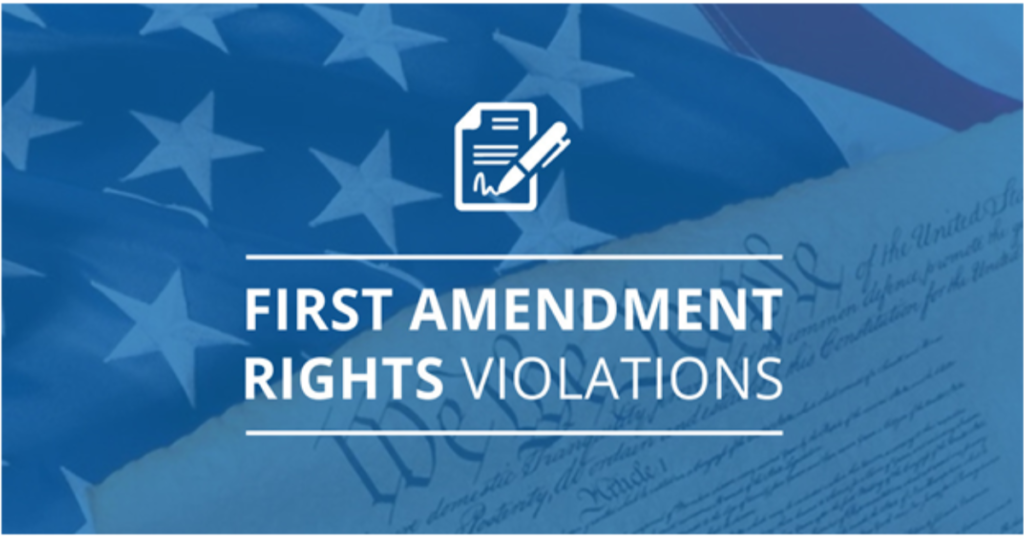 The First Amendment to the Constitution of the United States of America is what guarantees us all, as US citizens, some of our most well-known and most cherished freedoms. As the first of the ten constitutional amendments known as the Bill of Rights, the First Amendment provides for freedom of religion, freedom of speech, freedom of the press, the right to assemble, and the right to petition the government.
Simple, short, and straightforward—yet incredibly powerful—the First Amendment reads as follows:
Congress shall make no law respecting an establishment of religion, or prohibiting the free exercise thereof; or abridging the freedom of speech, or of the press, or the right of the people peaceably to assemble, and to petition the government for a redress of grievances.
Congress initially passed the First Amendment on September 25, 1789. It was then ratified by the states on December 15, 1791. For more than 100 years, it was only applied to federal laws. In 1925, however, the Supreme Court began applying it to state laws as well through a process called incorporation.
As important as the First Amendment is to the country, it is still rather vague. Because of this, in the end, its interpretation and how it should be applied in different situations is ultimately left up to the judgment of the Supreme Court.
The First Amendment to the Constitution of the United States of America is what guarantees us all, as US citizens, some of our most well-known and most cherished freedoms. As the first of the ten constitutional amendments known as the Bill of Rights, the First Amendment provides for freedom of religion, freedom of speech, freedom of the press, the right to assemble, and the right to petition the government.
Simple, short, and straightforward—yet incredibly powerful—the First Amendment reads as follows:
Congress shall make no law respecting an establishment of religion, or prohibiting the free exercise thereof; or abridging the freedom of speech, or of the press, or the right of the people peaceably to assemble, and to petition the government for a redress of grievances.
Congress initially passed the First Amendment on September 25, 1789. It was then ratified by the states on December 15, 1791. For more than 100 years, it was only applied to federal laws. In 1925, however, the Supreme Court began applying it to state laws as well through a process called incorporation.
As important as the First Amendment is to the country, it is still rather vague. Because of this, in the end, its interpretation and how it should be applied in different situations is ultimately left up to the judgment of the Supreme Court.
First Amendment Right Violations
 The First Amendment to the Constitution of the United States of America is what guarantees us all, as US citizens, some of our most well-known and most cherished freedoms. As the first of the ten constitutional amendments known as the Bill of Rights, the First Amendment provides for freedom of religion, freedom of speech, freedom of the press, the right to assemble, and the right to petition the government.
Simple, short, and straightforward—yet incredibly powerful—the First Amendment reads as follows:
Congress shall make no law respecting an establishment of religion, or prohibiting the free exercise thereof; or abridging the freedom of speech, or of the press, or the right of the people peaceably to assemble, and to petition the government for a redress of grievances.
Congress initially passed the First Amendment on September 25, 1789. It was then ratified by the states on December 15, 1791. For more than 100 years, it was only applied to federal laws. In 1925, however, the Supreme Court began applying it to state laws as well through a process called incorporation.
As important as the First Amendment is to the country, it is still rather vague. Because of this, in the end, its interpretation and how it should be applied in different situations is ultimately left up to the judgment of the Supreme Court.
The First Amendment to the Constitution of the United States of America is what guarantees us all, as US citizens, some of our most well-known and most cherished freedoms. As the first of the ten constitutional amendments known as the Bill of Rights, the First Amendment provides for freedom of religion, freedom of speech, freedom of the press, the right to assemble, and the right to petition the government.
Simple, short, and straightforward—yet incredibly powerful—the First Amendment reads as follows:
Congress shall make no law respecting an establishment of religion, or prohibiting the free exercise thereof; or abridging the freedom of speech, or of the press, or the right of the people peaceably to assemble, and to petition the government for a redress of grievances.
Congress initially passed the First Amendment on September 25, 1789. It was then ratified by the states on December 15, 1791. For more than 100 years, it was only applied to federal laws. In 1925, however, the Supreme Court began applying it to state laws as well through a process called incorporation.
As important as the First Amendment is to the country, it is still rather vague. Because of this, in the end, its interpretation and how it should be applied in different situations is ultimately left up to the judgment of the Supreme Court.